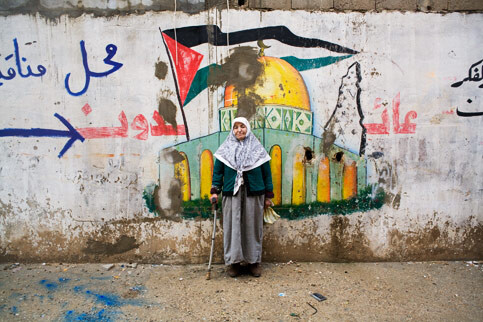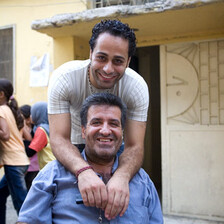
A Palestinian woman who survived the Nakba in 1948 stands next to a mural in the Nahr al-Bared refugee camp, December 2007. (Matthew Cassel)
I left Lebanon more than a week ago and am only now starting to find words. I have never before been in a place that has seen so much war. Occupation, yes. Injustice, yes. Death and destruction and uncertainty, perhaps. But something felt different about Lebanon. I have not wrapped my mind around it enough to feel confident that what I write will accurately represent my own thoughts, let alone the actual situation. But I do want to tell you about Nahr al-Bared.
You may have heard of Nahr al-Bared, one of the Palestinian refugee camps in the north of Lebanon, when the Lebanese army almost completely destroyed it this past summer. All of the residents were forced to leave, made refugees for at least the second time, and most people are still forbidden by the army from returning. I visited the area with a friend who has spent a lot of time there. We stopped first at Baddawi refugee camp, where many of Nahr al-Bared’s residents are living inside the UN schools (because of this, the schools have been closed since the beginning of the school year). I have never seen such obvious displacement. People have reconstructed a sort of life in this school, with different families in different rooms, or often many families in one room with a tarp separating them. All their belongings are there, with makeshift closets and bureaus for clothes and small ovens to cook food. The schoolyard is full of clotheslines and small stores sell snacks at the base of the school. Life almost seems normal, though the setting completely absurd. I could blink and imagine the people back in their camp, or even in their villages that they have not seen since 1948.
I think about my association with the word “refugee.” It should, by definition and by international law, be temporary. And yet my experience with refugees has been with Palestinian people in West Bank refugee camps, relatively developed communities where people have been living for 60 years and which are not entirely dissimilar to the towns around them, with the exception of the narrow streets and fewer services. I realize that “Palestinian refugee” to me has been a stationary, permanent identity. This does not reflect justice or people’s desires, but it does reflect a certain current reality. Not so in Lebanon, and most of all in the displaced communities of Nahr al-Bared residents.
When we arrived in Nahr al-Bared itself, it was like a ghost town. A deliberately created ghost town, virtually empty of people and full of shelled and collapsed homes. We stood on a roof near the entrance. To the left was a beautiful snow-covered mountain, to the right the Mediterranean Sea, and in the center thousands of empty, destroyed homes. The teenage boys who had invited us to the roof are among the few families who have been allowed back into the camp. “Even Israel doesn’t destroy like this, does it?” they asked, as they watched their new pigeons fly in circles around the house. I thought of Rafah, Gaza, the only place I have been that resembles the destruction of Nahr al-Bared. But even the destruction of Rafah was not of this scale.
We walked around the camp, which I dare to call beautiful in many ways. A river runs through the middle, and the camp is on the sea. There is more green than I have ever seen in a refugee camp. My friend described to me how Nahr al-Bared is one of the more traditional camps, that many communities find themselves resisting with weapons or giving up altogether, but here the resistance has been in the preservation of culture and traditions, like wedding rituals at the river.
Again, I could blink and imagine the camp as the vibrant community that it was until May. And I could feel a taste of pre-1948 Palestinian life that I have only occasionally felt while walking through the lands of destroyed villages with Nakba survivors themselves.
A small block of temporary UN housing holds a few hundred people. We walked through the area, gathering a small entourage of children as we went. “Where are you from?” a little girl asked one of us. “Chicago,” responded one of the members of our group. “I’m from Saffourieh,” said the girl. I turned around and asked her, “From where?” I wanted to make sure I had heard right. This young girl had given the name of a destroyed village inside present-day Israel that not only has she never been to, but I have. While some of Saffourieh’s residents apparently fled to Lebanon, others fled only a few miles away and currently live in Nazareth. I have visited the land with some of these people.
At the only public clinic in the camp, we met a man who told us he was the last doctor to leave the camp and the first to return. The clinic is open 24 hours a day, and the staff work as volunteers. They barely have money for medicine.
We began to talk with the doctors, and it turns out one of them is originally from Saffourieh as well. Which is to say that his parents were displaced from Saffourieh in 1948. He has never been. We told him that we had been there, and he began to ask questions: “What does it look like?” “What do the Israelis call it now?” “Do people live there?” We told him what we know. “If only I could go,” he said. When we left, he said he hopes to see us again, next time in his village of Saffourieh.
We walked out of the clinic, trudged through the mud away from the destruction and towards the checkpoint at the entrance of the camp. Refugees are refugees, I thought, people displaced from their communities by force. Whether they have carried this identity for a few months or several decades, whether they have been displaced once or twice or many times over, their right to return is sacred. Whether to Nahr al-Bared or to Palestine, the choice to return should be theirs. Because, unfortunately, I can blink and imagine their settings transformed as many times as I want, but it is no more effective than clicking my heels together and wishing them home.
Hannah Mermelstein is co-founder and co-director of Birthright Unplugged, which takes mostly Jewish North American people into the West Bank to meet with Palestinian people and to equip them to return to their own communities and work for justice; and takes Palestinian children from refugee camps to Jerusalem, the sea, and the villages their grandparents fled in 1948, and supports them to document their experiences and create photography exhibits to share with their communities and with the world.
Related Links





